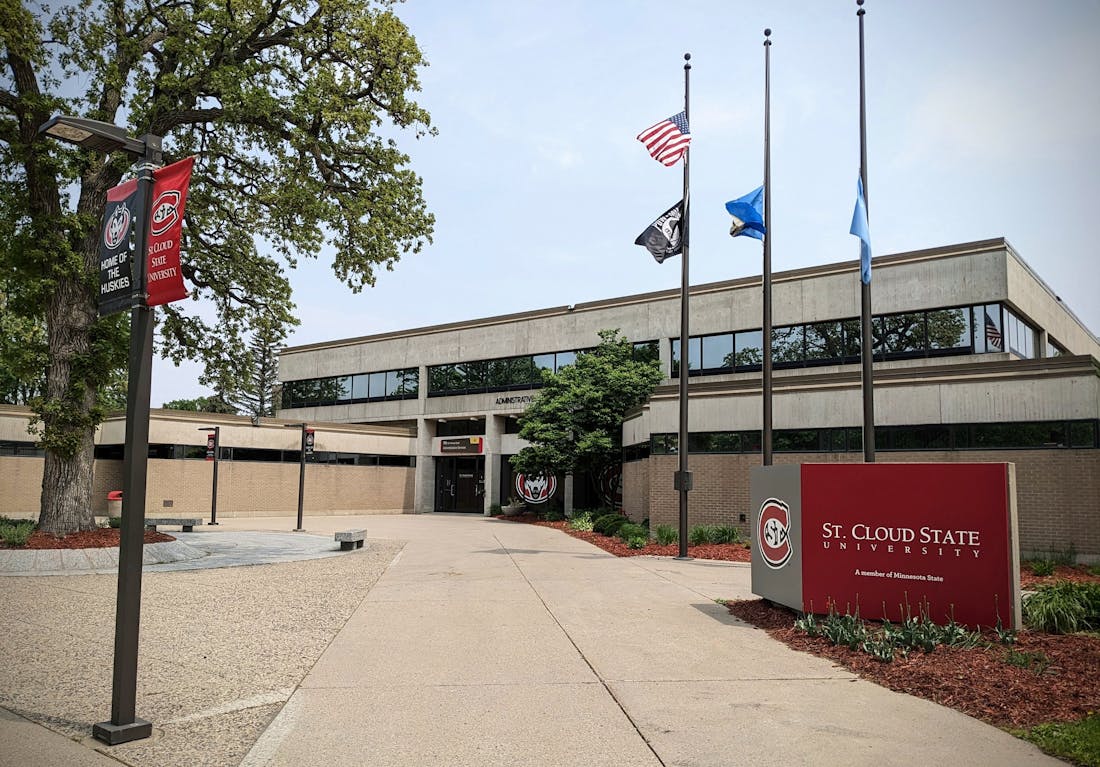ST. CLOUD — The regional university here is vying to become the first in the Minnesota State system to offer seven-week "accelerated online programs" — targeted at adults with unfinished bachelor's degrees — using a Dallas-based for-profit company that promises to recruit students and help retain them through graduation.
St. Cloud State University leadership is banking on the new partnership to make a dent in its colossal budget deficit and expand its reach to help some of the 1.2 million Minnesotans with college credits but no bachelor's degree.
But critics say the plan is a futile attempt to temporarily inflate enrollment while the online management company Academic Partnerships takes 50% of the program's tuition dollars.
University leaders say they want to reach nontraditional students, many of them adults from historically underserved communities, at a time when traditional student enrollment is plummeting. The student head count at St. Cloud State has dropped from more than 16,000 in 2013 to about 10,000 last fall.
"It's on us to do whatever it takes so that St. Cloud State University can remain a thriving and evolving university for generations to come," Robbyn Wacker, St. Cloud State president, told faculty in August. "Keeping our university frozen in time will be its demise."
ST. CLOUD TODAY
Sign up for the St. Cloud Today newsletter

St. Cloud State had planned to launch about a dozen accelerated online programs this fall. But this spring, after cutting dozens of faculty positions and suspending 70 academic programs, the Minnesota State system hit pause.
Now, Minnesota State is reviewing the proposal — examining the programs for academic rigor and the sustainability of its business model — before making a decision this fall.
Katherina Pattit, dean of St. Cloud State's business school, is overseeing the development of some of the online programs and welcomes the "additional quality control."
"It is very true not all of these partners are created equal," she said, "and there are, in fact, some bad actors and practices out there."
Many online management companies are being scrutinized by the federal government because of complaints about the educational value of online programs.
Academic Partnerships spokeswoman Katelynn Dugan said the company doesn't interfere with a college's decisions on admission standards, tuition costs, advising services, curriculum or instruction.
"The same rigor [students] have on campus will be the same rigor they have online," Dugan said.
Why contract with a for-profit company?
St. Cloud State leaders say they need outside help because like many universities, theirs is still primarily designed to recruit and instruct young adults seeking an in-person experience.
"This will be very important for the [prospective nontraditional students] because we can't just go to a high school with our outreach team," Pattit said. "These people are all over the place and it's very hard to reach them."
Academic Partnerships works with about 50 colleges across the country, but mostly with graduate programs. Dugan said the company's tuition model is designed to keep students enrolled.
"We provide all the upfront capital investment to help get the programs into an online format, then we help to recruit and retain those students through completion," she said. "And as the student progresses, we get a share of that tuition, which means that if they stop progressing, we stop being paid."
Why the push for 7-week online courses?
The proposed accelerated online courses are established programs at St. Cloud State — ranging from community health and psychology to nursing and cybersecurity — that would be formatted into seven-week classes.
Nursing professor Roxanne Wilson, who helped create the online program, is now helping transition semester courses to seven-week segments. She said the fast-track coursework is designed to be highly interactive to keep students engaged, and that she and many of her nursing colleagues are excited about the idea.
"I don't have reservations," she said. "Do I think we'll have some challenges and things we need to change? Of course. But if we're looking at how to meet the needs of the population of working adults, we have to do some things differently."
Pushback from faculty
After Wacker announced the cuts this spring, the faculty union launched a "Save St. Cloud State" campaign to draw attention to the university's "seven-year, $32 million contract with a predatory for-profit company."
If accelerated online programs are in demand, faculty could develop their own, argued Jenna Chernega, president of the Inter Faculty Organization, which represents professors at Minnesota State universities.
"I think we have faculty who do a really good job at teaching online, and online education is a really good option for some students," she said.
Chernega warned that many for-profit companies take advantage of low-income students or students of color by targeting them to sign up for classes but not caring about student success, often leaving these students with more debt and no degree.
Fred Zimmerman, a former professor at St. Cloud State, left the university this summer because he didn't like the administration's direction, including on what he called a "foolish" relationship with Academic Partnerships.
"Some people call [online management companies] academic parasites. Some people call it snake oil associations," he said. "It's not well thought of."
Zimmerman, a longtime professor who helped found the school of engineering at the University of St. Thomas, taught graduate and senior-level classes at St. Cloud State, including a seven-week graduate course on strategic management.
He estimated that the accelerated classes fit only about 60% of the content from a semester-long in-person class.
In a rare public pushback, university administrators responded to the "Save St. Cloud State" campaign with their own "Stand with SCSU" webpage and hashtag. The page features videos of professors and local business leaders who support the university's plans, as well as details about the agreement with Academic Partnerships.
Pattit, the business school dean, said she rejects the idea that condensed classes are less rigorous; instead, she said, faculty are challenged to highlight the most critical lessons.
Is there a need — at all?
The university projects it would earn $2.5 million in 2024 and $10 million in 2025 from the online accelerated programs.
But the university will be up against significant competition as it tries to recruit people looking to finish their degrees.
"If people really want to pursue online degrees, there are options all over the place," said Neil Kraus, a political science professor at University of Wisconsin, River Falls, and the author of three books on education policy.
Kraus said he thinks the real driver behind the push for new accelerated online courses are for-profit companies trying to make money and colleges desperate for enrollment and tuition dollars. He worries the result won't actually benefit working adults.
"We're going to give more people bachelor's and advanced degrees, saddle them with more debt, make them fight for fewer jobs," Kraus said, "and then higher ed will get blamed for that."
St. Cloud State graduate David Tostenson, now a philosophy professor at Fort Hays State University in Kansas, has first-hand experience with creating an online program to attract students. The university advertised heavily on social media and students signed up — and then many failed to complete their degree.
"We have people who have been in the program online for eight or nine years and they're not graduating," he said.
Tostenson said online programs can be a good thing, but the burden often falls on students to be proactive and not fall behind.
"Just because it's easier to sign up doesn't mean it's easier to finish," he said.





